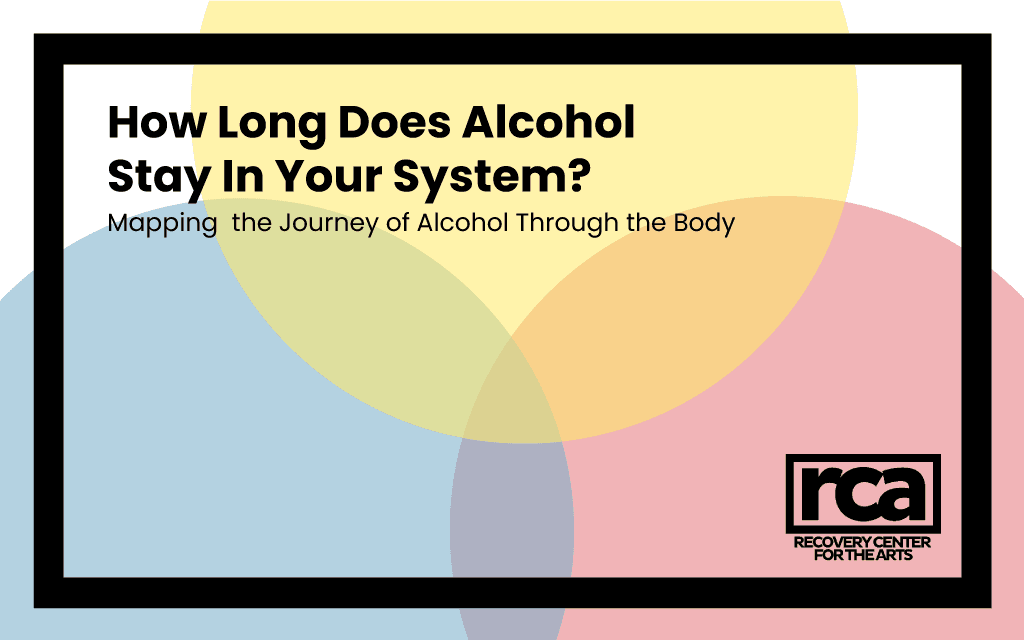
“My forehead covered in cold sweats
Body shakes beyond control
The endless aching in my bones
As you consumed my very soul.”
- Shirley J. Stankiewicz. "Good-Bye."
Partying is portrayed across all forms of media. From coming-of-age movies to songs about partying all night, when you think about having a good time the thought of alcohol is likely to cross your mind.
Here in Arizona, nearly 1 in 5 adults binge drink at least once a month. Do you know how much alcohol is too much? Is there a way to get sober faster so you can drive home after a night out? How long does alcohol stay in your system? Our team here at Recovery Center for the Arts is here to answer that and more.
Mapping the Journey of Alcohol Through the Body
To better understand the detection timeline for alcohol, it’s important to know what organs are a part of the processing in the first place.
The primary organs impacted by drinking are those in your digestive system. This is where the alcohol you consume is primarily processed. This means organs like the liver, small and large intestines, kidneys, and bladder all play an important role.
Beyond that, your blood vessels, heart, lungs, and even brain are also impacted by alcohol use. While they don’t play as big of a role in how alcohol is processed, your blood holds a lot of information and carries different chemical components of alcohol that can later be detected by various drug tests.
How Long Alcohol Stays in Your System
There are many factors to consider when asking how long alcohol is in your system. There’s a difference between when it’s actually present and how long it can be detected.
On average, it takes about one hour for your body to process a single drink. However, this isn’t an exact science. The absorption rate and processing time will vary depending on the concentration of alcohol as well as several other factors.

What Factors Influence How Long Alcohol Stays in Your System?
While we do have a fairly good idea of how long alcohol stays within the body, this timeframe isn’t exact. This is because there are many factors that can influence the specific timeline of alcohol’s journey through a person’s body.
First, there are the drinks themselves. Not only does the alcohol concentration influence how it’s processed, but the amount you drink can as well.
Second is your personal health. This includes everything from your age to your metabolism and even your history of alcohol use. Genetics can also play a big role, especially if you have an alcohol intolerance.
Finally, what’s in your body influences how quickly it’s processed. This includes what you eat in a day, how hydrated you are, and what other substances you have in your body.
How Are Alcohol Levels in Your Body Measured?
On the surface, it might seem like alcohol and drug tests try to detect the substance present within your body, but it’s more complicated than that.
Alcohol and other drug tests aren’t looking for the substances as a whole, but rather the chemicals produced by it being present in the body. In the case of alcohol, tests generally look for the presence of ethanol (ethyl alcohol) as opposed to the other components of a drink. Other tests look for ethyl glucuronide, or EtG, which is a byproduct of the processing of ethanol. This is why drug tests can detect a substance even when it’s no longer present in your body.
What is BAC?
BAC stands for blood alcohol content. Its definition is fairly straightforward, BAC is the percentage of alcohol (specifically ethanol, which is produced when you drink alcohol) in a person’s bloodstream.
So, if you have a BAC of .10%, your blood contains one part alcohol for every 1000 parts blood.
The Most Common Drug Tests for Alcohol
When you think of someone testing you for alcohol consumption, you’re probably thinking of being pulled over by a cop and having to do a breathalyzer test, right?
Beyond breathalyzers and drunk driving, there are other reasons someone might be tested for alcohol consumption. The primary reason would be legal ones, like needing to go to rehab after getting a DUI or a judge’s order for a custody case.
In these cases, a urine or blood test might be used to detect how recently alcohol has been consumed, as opposed to testing for a certain concentration of alcohol in the body.
Ethanol Urine & EtG Alcohol Tests
Urine tests detect ethyl glucuronide within the body and can detect it longer than blood or breathalyzer tests. Depending on someone’s history with alcohol, urine tests can detect EtG up to 72 hours after your last drink.
Breathalyzer Tests
As alcohol is processed in the body, it gets into the bloodstream. When this blood passes through the lungs, some alcohol vapors are left behind. A breathalyzer test measures the concentration of alcohol in the vapors of your breath and is able to determine the amount of alcohol in your bloodstream from that. They’re most effective 15 minutes after your last drink.
The Facts and Myths of How to Sober Up Faster
There are many different “tips and tricks” on how to sober up. Whether you’ve heard them online, or were told them by a friend, you likely have heard of a trick or two before.
But, are any of these tricks true? Let’s take a look at some of them.
- Drinking coffee – Coffee is a stimulant, which is the opposite of alcohol, a depressant. Because it’s the opposite, the effects of the two can feel like they cancel each other out. This isn’t true. Both are still present in your body and you’re just as intoxicated as you were before you drank the coffee.
- Drinking water – Regardless of its effects, hydration is important when you’ve been drinking alcohol. Alcohol is a diuretic, which means it encourages you to urinate. If you don’t replenish this water, you can easily become dehydrated. Dehydration is a common source of the side effects of a hangover. Even though it won’t “flush the alcohol” out of your system, hydration is still important.
- Taking a cold shower – A cold shower can act like a shock to the system, sometimes feeling akin to an adrenaline rush. This would have similar effects as drinking coffee, meaning it counteracts some of the side effects of alcohol. This doesn’t actually speed up the process of alcohol leaving the body, just gives an illusion that you’re more alert than you were a moment earlier.
- Sleeping – While, in theory, you will be more sober than you were before you fell asleep, it’s not any faster of a process than if you were awake. The perks of sleeping include that you’re not ingesting more alcohol and that your body can better focus on digestion instead of everything else, too. However, this won’t speed up the process of alcohol passing through the body by a large amount.
To put it simply, there’s no life hack to becoming sober faster. While you can have the illusion of sobriety, the amount of alcohol in your system will remain the same. This means that even if you suddenly feel better, it’s still not safe to drive or do other risky activities.

Seeking Recovery for Alcohol Use in Arizona
The only surefire way to come up clean on a test for alcohol use is to not drink alcohol. That can seem like a big ask, but through rehab for alcoholism, you can find a new path in life.
When you’re in the thick of things, it can be easy to overlook how much alcohol use has truly impacted your life. When’s the last time you had fun without a drink in your hand? How much of your day is consumed by drinking, whether it’s thinking about it or recovering from it? Does some part of you wish you could stop but when you try you experience negative effects?
You’re not alone, and you deserve a healing program that will help you connect with your inner child once more.
Our team here at Recovery Center for the Arts uses the power of creativity in our healing program. We offer you support and care on your healing journey away from alcohol use. We’re ready to walk with you as you pave your new path, just give us a call anytime at [(480) 386-1593](tel:(480) 386-1593) to get started today.
Recovery Center for the Arts – Finding recovery through creativity.

